- Home
- Sharyn McCrumb
The Windsor Knot Page 15
The Windsor Knot Read online
Page 15
“Well, damn!” said Wesley. He pulled out his handkerchief and draped it over the telephone receiver as he lifted it. “Now I’ve got to get Wayne Dupree in on this case, and he’ll probably make me come testify in court for him. Pigheaded so-and-so. Hello, this is Sheriff Wesley Rountree here, from over in Chandler Grove. Let me speak to your sheriff, please. Wayne? That you, good buddy? Great to talk to you!”
In the privacy of his bedroom, Charles Chandler stared at the letter as if he were afraid it might explode. Finally, after days of silence, the lovely blonde from the Highlander ad had answered his letter. He was almost afraid to open it. He didn’t suppose that anyone would waste a twenty-five-cent stamp just to tell him to go to blazes. How odd, he thought, that even though this was an essentially financial transaction on his part, he still had the pounding heart and sweaty palms of a lovesick adolescent. There was barely a week left until the wedding.
“I hope she’s desperate,” he muttered, opening the letter.
It was written in ink, in that rounded handwriting that young women usually outgrow before they are thirty. She wasn’t lying about her age, he decided. There was no return address or phone number given, he noticed, but all the same it didn’t seem to be a rejection. The lady was wary. Charles decided that she was wise to be cautious, considering the nature of the communication. After all, anybody could buy a magazine and answer the ads. He thought that she would be wise not to answer letters postmarked Leavenworth or San Quentin. Charles read the letter through twice, once for content and once for clues.
Dear Charles Chandler,
This is a reply to the letter that you sent to Snow White at the Highlander magazine.
Since there aren’t too many people in this region, I thought I’d know every person who answered my ad, at least by name, but I’ve never heard of you. (Are you related to Geoffrey Chandler, by any chance?) And you didn’t say whether you worked around here, or what you did. At first I thought it might be some kind of alias or a joke from one of my friends, but your letter sounded sweet, and I decided to answer it anyway.
If this does turn out to be a practical joke, I’ll be very mad.
Shouldn’t you tell me more about who you really are? Well, never mind. I was very interested to hear that you are a scientest [Charles winced at the spelling] and although we seem to have rather different interests, you certainly sound like a nice enough person. I have decided that it wouldn’t do any harm to meet you, and see if we hit it off. I’m kind of busy right now (as ever!), but I could manage to meet you for a drink at Bubba’s in Milton’s Forge. If that is all right with you, meet me there at seven Wednesday evening at the bar.
Since I’m still not sure that this isn’t a joke, I don’t believe I’ll tell you who I am until I see you. But I do hope you are for real.
I’ll see you Wednesday, then, at Bubba’s, if you decide to go through with this. I’ll be wearing a white jacket with a rose on the lapel and carrying an umbrella.
See you soon, I hope!
Snow White
CHAPTER 11
IF SHERIFF WAYNE Dupree was delighted to see his friend and colleague from the neighboring county, he managed to conceal it with admirable restraint. After receiving the unexpected summons from Wesley Rountree, he had dispatched the mobile crime lab and set out for the crematorium, where he intended to get some answers as to what Wesley thought he was doing discovering dead bodies in someone else’s jurisdiction.
He found Sheriff Rountree sitting in his patrol car on the gravel driveway, listening to a Statler Brothers tape. Motioning for his men to cordon off the crime scene and get to work, Wayne Dupree ambled over to Rountree’s patrol car to discuss the situation.
“’Afternoon, Wayne,” said Wesley amiably. “You gonna read me my rights? I got my Miranda card here if you’d like to borrow it.”
Wayne Dupree’s frown deepened. “You wanna tell me what’s going on here?” he growled. It was his opinion that Wesley Rountree was almost as clever as he thought he was. This combination of arrogance and cunning always made Wayne a little uneasy. He suspected Wesley of being up to something at nearly every encounter they had, be it sheriff’s-association politics or a jurisdictional dispute over a suspect.
Wesley Rountree was mildness itself. “Honest to Pete, Wayne,” he said, holding up a hand in protest, “I just drove over here to question this individual. I didn’t even have the notion of getting a warrant-and arrest was definitely not on my agenda. To tell you the truth, I’m not even sure I have a crime.” He looked thoughtful. “Well, I guess I’m sure now, considering what happened to my witness.”
“He was dead when you got here.”
Wesley nodded. “Cold. Rigor mortis was passing off. I had to check to see if he was beyond help, but other than that I didn’t disturb anything. I called you and walked right out.”
Wayne Dupree was looking anxiously toward the cinderblock building, where his investigators were performing their tasks.
Wesley looked sympathetic. “You want to go over there and see what’s going on, Wayne? I’ll go with you.”
“Yeah, but you haven’t told me-”
“I’ll tell you while we watch,” said Wesley soothingly.
“Good,” grunted the older sheriff. “They can fingerprint you while they’re at it.”
They made their way to the waiting-room side of the crematorium office, where they could observe the bustle of activity without being in anyone’s way. Wesley carefully explained the events of the past few days to an increasingly skeptical Wayne Dupree.
“… And that’s about it,” Wesley concluded with a sigh. “I reckon if Emmet Mason had had enough common sense to use a fake name once he got out there to California, none of this would have happened. He could have just died as John Smith, or whoever he wanted to be, and nobody here would ever have known the difference. I guess he must have kept his old Georgia driver’s license for sentimental reasons. Or maybe he wanted to make sure he’d get back home when the time came.”
Sheriff Dupree shook his head in disapproval. “What about the insurance money?”
“The money his widow received five years ago, you mean?” asked Wesley. “That has pretty well stumped our insurance agent, let me tell you. He is not used to complexities of this nature. The way he figures it, she wasn’t entitled to the money because her husband wasn’t dead, but by the time they discovered the fraud, her husband was dead, so they would owe her the money after all. He practically had smoke coming out of his ears by then, so I told him to call the home office in Atlanta and ask them to put one of their company lawyers on the case.”
“Was the wife in on the fraud?”
“No, indeed. She’s madder than a scalded cat.”
“So you think this establishment here provided the ashes that helped perpetrate the fraud?”
“Well, I had to ask,” said Wesley. “I didn’t see how Emmet Mason could have known anybody in California who would fix him up with a fake urn, unless those folks advertise in magazines, which doesn’t seem likely and doesn’t bear thinking about.”
“The fact that somebody murdered old Jasper seems to confirm your suspicions,” Wayne Dupree admitted.
“Yeah, that’s what I thought. Who was this Jasper Willis anyhow?”
They turned and looked at the form in the dark suit, presently being outlined in chalk.
“Oh, he’s local,” said the sheriff. “I didn’t know him too well, of course. My county is bigger than yours.” He smirked.
Wesley thought up a rude reply, but did not say it.
“His dad owned a big funeral home downtown, which he left to his two sons: Jasper and the older boy, Jared. That’s the brother I’m acquainted with. He does a lot of civic work. Jared Willis is a good man, knows his business, pillar of the community, but Jasper was just so much dead wood. Didn’t want to go into the funeral business. Couldn’t seem to make a go of a regular job. Finally, Jared Willis got the idea of investing in a crematorium to service
the whole region. He knew it wouldn’t make much money now-might even be a tax loss, he told me once-but he figured that in case the environmentalist movement really caught on here, the place could become profitable in ten years or so.”
“Maybe so,” said Wesley politely.
“Meanwhile, he put Jasper out here to run it, with some help from the other mortuary employees on an as-needed basis. There wasn’t a lot to do, so Jasper couldn’t make too much of a mess of things.” The sheriff looked again at the crime scene and frowned. “Apparently, though, he managed to do it, anyhow.”
Wesley digested this information. “Say, Wayne,” he said thoughtfully, “you said Jasper didn’t want to be a funeral director. Do you have any idea what he did want to be?”
Sheriff Dupree considered it. “Nothing sinister,” he said at last. “Not like drugs or racing stock cars, or anything. Let’s see, what was it?” He looked at the office, and suddenly his face cleared. “I’ve got it! He wanted to be a travel agent.”
Wesley nodded. “You know, Wayne, I believe he was.”
* * *
Visitors to Chandler Grove were often a bit disconcerted to learn that the Grey House was actually a bright yellow Colonial with green shutters, but the locals would explain to them that the name of the house referred to its owners rather than to its physical attributes.
It had been built around 1930 by Dr. Sanford Grey, at that time the only physician in the county. He had made house calls at all hours of the day or night, braving the red clay roads on a large bay mare named Daisy, who was more reliable on uncertain terrain than the cars of that era. The doctor had accepted payment for his services in hams and fresh eggs, if need be. Somehow, despite these sacrifices, he had managed to become quite wealthy, and he had married well, which is always useful, if one happens to be of a charitable nature in business. Dr. Grey and his wealthy but mousy wife Evangeline had built a grand and spacious house and raised two daughters, neither of whom ever married, though perhaps for different reasons. Local gossip had it that Miss Geneva was too shy to be courted, and Miss Aurelia was too fierce to be wanted.
In the Forties the teenaged sisters went away to a genteel girls’ school-and then came home again. Miss Geneva had acquired expert instruction in fine sewing, a collection of Victorian poetry, and the ability to play the complete works of Stephen Foster on the piano. The only oversight in her otherwise well-spent four years was neglect in finding a husband, but, as she seemed disinclined to remedy the matter, her parents welcomed her back into the fold, and she resumed her previous duties of sewing and flower arranging as if her mind had not been sullied by Latin verbs and plane geometry.
On the other hand, Miss Aurelia had graduated cum laude with a degree in nursing, much disapproved of by her mother, but at last it was decided that propriety would be served if she only worked as an assistant to her father, where her contacts with the unsavory side of life could presumably be monitored by her ever-watchful parent. What Miss Aurelia thought of this was not discussed outside the family, but those who knew her in later years suspected that the argument had taken place fortissimo and almost entirely in words of Anglo-Saxon derivation. Nevertheless, in this case age and treachery overcame youth and skill, and Aurelia Grey, after discovering that no medical personnel were inclined to hire her (a quiet word from the doctor was always suspected in this matter), she settled into Chandler Grove to serve as her father’s assistant. By all accounts, she had been good at her job; indeed, had she belonged to a later generation, she would have become a doctor herself, but unfortunately hers was not to be a lasting career.
In the late Fifties, Dr. Grey died of a heart attack while smoking his third cigar of the evening at the annual church barbecue. By the time the old doctor had passed away, his neurasthenic wife was well on her way to becoming a picturesque invalid. The practice was passed on to other physicians (most notably Robert Chandler), and Miss Aurelia devoted her nursing skills to the care of her mother. Despite Mrs. Grey’s delicate constitution (vaguely described to appropriate inquirers as female trouble), old Mrs. Grey had managed to live to be eighty-four, thanks perhaps to the devoted nursing of her daughters. When at last she died, Miss Geneva was quite prostrate with grief, while her sister tidied up her mother’s legal affairs, parceled out her clothes, and-as soon as she could safely leave her grieving sister-departed for a vacation in Florida.
People thought that it was high time Aurelia Grey had a bit of fun in life, and no one could have been more surprised than Chandler Grove to learn two weeks later that Aurelia herself had died suddenly while visiting the Everglades. All things considered, her sister took the additional loss rather well, and she continued to live on in the house, pursuing her routine of church work and fine sewing just as she had before. Everyone said they would have thought that Miss Geneva would be the first to go, being delicate like her mother; but the more progressive town gossips noted that Type-A personalities like Dr. Grey and his eldest daughter were the best bets for an early demise. Overengined for the beam, they declared.
By the time she had arrived for a consultation with Miss Geneva Grey, Elizabeth had been thoroughly briefed on the family history, because Southerners believe that who you are has very little to do with present circumstances. Elizabeth had, of course, been instructed to mention none of what she had been told, and indeed, under no circumstances was she to allow the word Everglades to be uttered in conversation with Miss Geneva.
She parked her car in the driveway under the oak tree and was heading up the cement walk toward the front door when a quick blast from a sports-car horn signaled the arrival of the maid of honor. Jenny emerged from her car, looking like a collector doll from the Danbury Mint. Her hair was a confection of spun gold and her scoop-necked garden dress in an English rose pattern looked like formal daywear. Two sizes larger, thought Elizabeth, and I could wear it to the Royal Garden Party. Okay, three sizes larger.
“Isn’t this exciting?” cried Jenny in her best Sparkle Plenty voice. “I just love dress fittings! If we had time, I know some places in Atlanta… Oh, but they’re a little expensive.”
“I’m sure this will be fine,” said Elizabeth. “I’ve brought some material and a pattern, but we can do some alterations in the design, if she’s up to it.”
Jenny looked at the bride-to-be appraisingly. “Honey, you did pick an A-line, didn’t you?”
Geoffrey Chandler did not limit his love of drama to the confines of the theatre. Indeed, he felt that the little comedies and melodramas played out in his native village afforded just as much entertainment as anything ever written by the Bard of Avon. Geoffrey was not necessarily inclined to gossip, as he saw no reason to share the best bits with anyone else, but he did enjoy keeping himself informed about the little dramas that were going on about him.
When his cousin Elizabeth had let slip her news about the reprise of Emmet Mason’s death scene and the subsequent suspicion that some of the local dearly departed had not gone so far as the hereafter when they exited Chandler Grove, he had resolved to pursue a quiet inquiry of his own. Geoffrey had no desire to be helpful to the police in this matter-or even to share his findings with other interested parties; he simply thought that it would be amusing to know.
“At least it would save one the bother of trying to call them up on the Ouija board, if one learns that they are presently residing in Escondido, California,” he remarked to himself. As soon as Elizabeth had left for her dressmaker’s appointment, Geoffrey went out to his own car and headed for the one-block section of downtown Chandler Grove.
He decided to forgo a look at the courthouse records. “I wouldn’t pass the time of day with Susan Davis to find out if I were dead,” he muttered.
Five minutes later, he strolled into the office of the Chandler Grove Scout, where Marshall Pavlock was hard at work, pasting up the Piggly Wiggly ad. He was a heavyset man with a shock of white hair and a mild expression somewhat at odds with his eyes.
“Hello, Marshall,” sa
id Geoffrey, edging past the customers’ counter. “Don’t let me disturb you.”
“I won’t,” said the editor and owner of the newspaper. “Not unless you’ve brought an ad about the new playhouse production.”
“Not yet,” said Geoffrey. “Ripeness is all.”
Marshall Pavlock frowned. “That’s Lear. I thought you were doing Twelfth Night.”
“Well, we are. Oh, never mind. Anyhow I’ve come about something else.” Geoffrey did not enjoy barding to an overeducated audience. It spoiled the spontaneity. “I’d like to look at the back issues of the Scout.”
The editor looked up from his ad with a puzzled expression. “Is there a scavenger hunt going on in town or something?”
“Why do you ask?”
“You’re the second person asking to see those papers. Now ordinarily we don’t get more than a dozen requests a year like that, and most of those are from high-school kids. I just wondered why all of a sudden it has become such a popular pastime.”
“Who was the other person who asked to see them?”
“The deputy. Clay Taylor. I got the impression from him that it was police business.”
“I expect it was,” said Geoffrey smoothly. “We probably want to see the papers for entirely different reasons.”
“Maybe so,” said Marshall. “But if you’re onto anything that would be useful as a news story, you let me know about it.” He motioned Geoffrey to the back room where the bound copies of the Scout were kept.

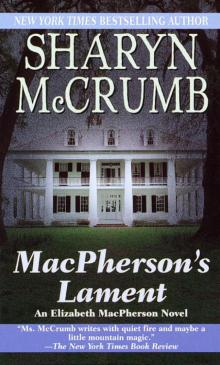 Elizabeth MacPherson 07 - MacPherson’s Lament
Elizabeth MacPherson 07 - MacPherson’s Lament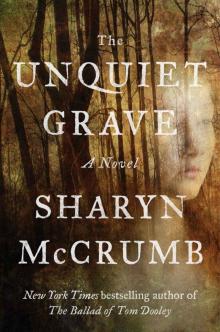 The Unquiet Grave: A Novel
The Unquiet Grave: A Novel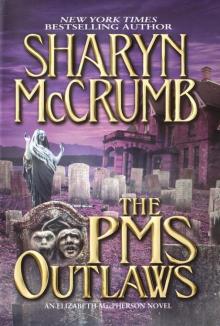 The PMS Outlaws: An Elizabeth MacPherson Novel
The PMS Outlaws: An Elizabeth MacPherson Novel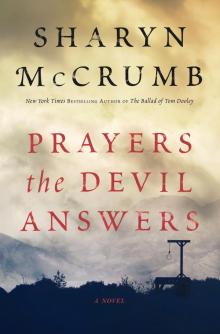 Prayers the Devil Answers
Prayers the Devil Answers Paying the Piper
Paying the Piper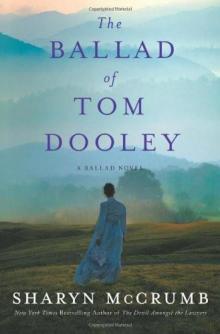 The Ballad of Tom Dooley: A Ballad Novel
The Ballad of Tom Dooley: A Ballad Novel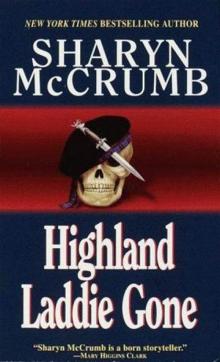 Highland Laddie Gone
Highland Laddie Gone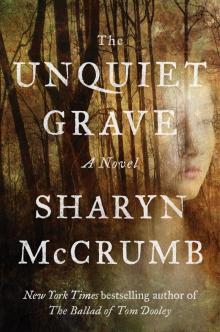 The Unquiet Grave
The Unquiet Grave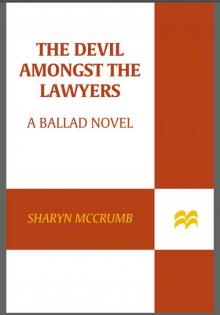 The Devil Amongst the Lawyers
The Devil Amongst the Lawyers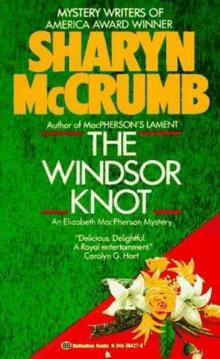 The Windsor Knot
The Windsor Knot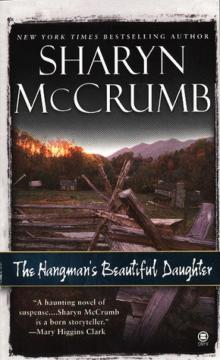 The Hangman's Beautiful Daughter
The Hangman's Beautiful Daughter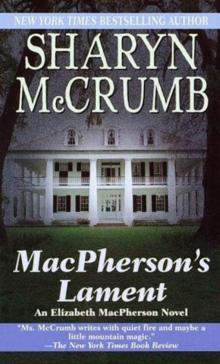 MacPherson's Lament
MacPherson's Lament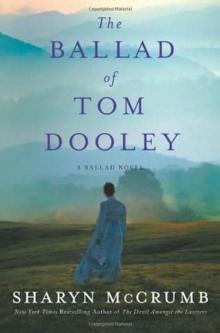 The Ballad of Tom Dooley
The Ballad of Tom Dooley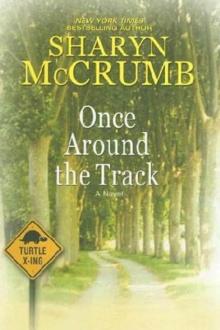 Once Around the Track
Once Around the Track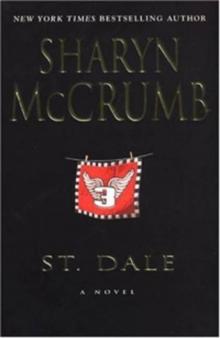 St. Dale
St. Dale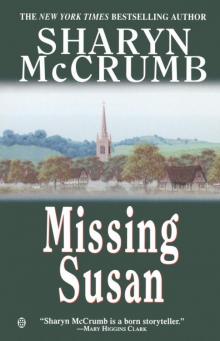 Elizabeth MacPherson 06 - Missing Susan
Elizabeth MacPherson 06 - Missing Susan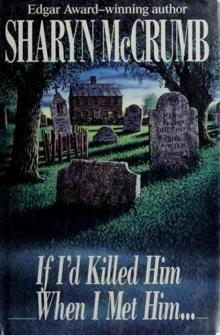 If I'd Killed Him When I Met Him…
If I'd Killed Him When I Met Him…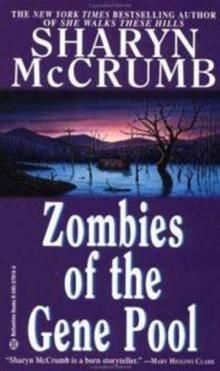 Zombies of the Gene Pool
Zombies of the Gene Pool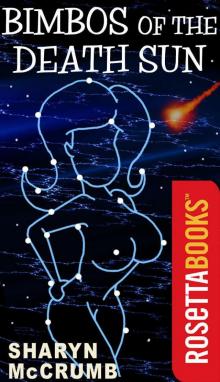 Bimbos of the Death Sun
Bimbos of the Death Sun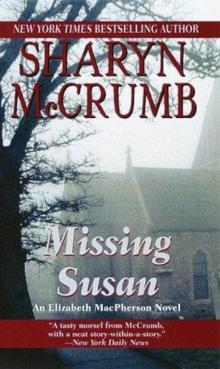 Missing Susan
Missing Susan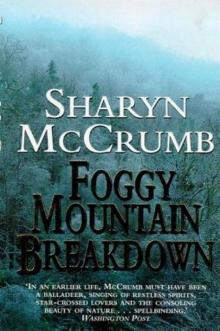 Foggy Mountain Breakdown and Other Stories
Foggy Mountain Breakdown and Other Stories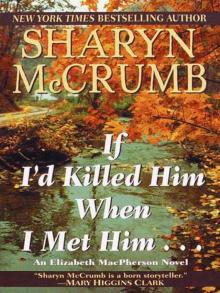 If I'd Killed Him When I Met Him
If I'd Killed Him When I Met Him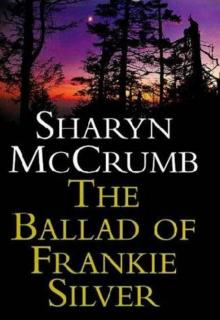 The Ballad of Frankie Silver
The Ballad of Frankie Silver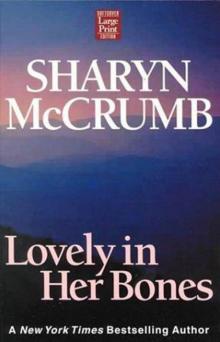 Lovely In Her Bones
Lovely In Her Bones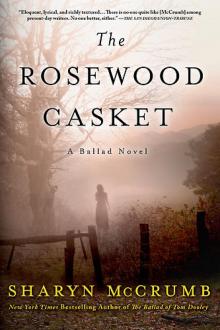 The Rosewood Casket
The Rosewood Casket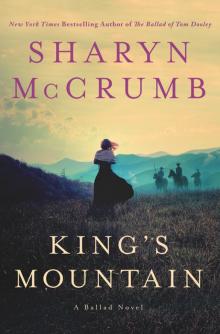 King's Mountain
King's Mountain